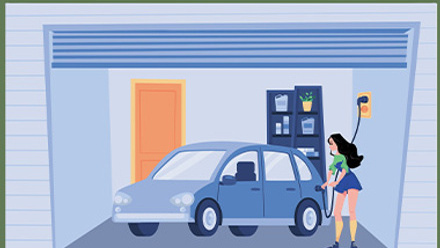How employer-run salary sacrifice schemes are helping the shift to EV
A lot has happened in the EV world over the past 18 months. The UK’s zero emissions vehicles (ZEV) mandate which came into force in January 2024 legally requires car manufacturers to improve their ratio of electric vehicles to ICE (petrol and diesel) vehicles until 100%% of new vehicle sales are zero emission for 2035. It’s designed to increase the number of EVs on the road.
And in July this year, a government-led electric car grant (ECG) scheme was introduced for new EVs, with discounts of up to £3,750 per car.
Meanwhile, the emerging second-hand EV market is really taking off. Statistics from automotive intelligence provider Marketcheck UK show that used EV sales ‘boomed’ by 149%% between July 2023 and 2025.
There’s also been a huge investment in infrastructure. According to Zapmap data, as of July 2025, there were 84,218 public charge points in the UK in comparison to 73,000 by July 2024 - an increase of 30% in twelve months.
By June of this year, there were 16,698 rapid or ultra rapid charging points across the UK. Data shows there’s been a 59% increase in ultra or ultra rapid charging points since 2024.
All this points to a booming market and increased consumer interest in EVs. EVs play a vital role in the UK’s 2050 net target, so affordability and increased availability to attract take up is important.
Salary sacrifice car schemes, where a pre-taxed portion of an employee’s salary is exchanged for a car, are helping to boost this take up, according to the British Vehicle Rental & Leasing Association (BVRLA). Use of these schemes grew by 51% in the twelve months to January 2025.
All this encompasses the wider, contextual picture on a national and governmental level. But how are employees themselves feeling about EVs? What’s important to them? What are their concerns?
The annual Tusker EV Driver Survey 2025 report had responses from 6,698 drivers across three core groups (drivers who are eligible for an EV but not participating in a Tusker salary sacrifice car scheme, drivers who have an EV through a Tusker salary sacrifice scheme and drivers who have an petrol or diesel car through Tusker) to identify motivations and concerns around the transition to EVs.
Here are some of the main trends revealed in the report:
EV drivers are satisfied and others are keen to make the switch
As has been consistently the case for years, the vast majority of drivers with a Tusker EV salary sacrifice car scheme are pleased they made the switch to an EV. 95% say they are either ‘satisfied’ or ‘very satisfied’, while 80% say driving an EV is more enjoyable than a petrol or diesel vehicle. 97% also said their EV has been either ‘reliable’ or ‘very reliable.’
In addition, 71% of non-Tusker drivers who don’t have an EV, expect they will transition to an EV ‘within four years’. This increased from 69% in 2024.
Just over a third (35%) also said they would swap to an EV if they had to change cars tomorrow. This clearly demonstrates the positive attitudes towards EVs among current drives.
But interestingly, those who do not drive EVs are not so convinced. One in five of those surveyed who don’t drive a Tusker EV say they would not choose electric if they had to replace their car tomorrow, while 43% of this group are ‘unsure’. Five percent said they would never make the switch.
Yet it is clear that once a transition has been made, satisfaction levels are very high.
Affordability continues to be an issue – but there are solutions
It’s no surprise that in the current climate, cost continues to be an issue for some. High cost was found to be a major barrier against transition to an EV for some. But recent years have seen changes.
Salary sacrifice EV car schemes generate significant tax and NI savings for employees because the sacrifice is taken before tax, creating savings for both employer and employee.
Also, the emergence of the EV second-hand market and more flexible product design of salary sacrifice schemes with longer lease periods, are making EVs more affordable for many more people.
And among the surveyed group of drivers who currently drive an EV, 62% said lower running costs was their main motivation in making the switch to electric and 69% said price, tax benefits and affordability were their reasons for switching to electric with Tusker.
Booming secondhand EV market
As previously mentioned, the used EV market has skyrocketed over the last 18 months to two years. The Society of Motor Manufacturers (SMMT) reported in February that sales of pre-loved EVs had reached record levels in 2024, rising to 57.4% and accounting for 2.5% of the entire market.
Tusker launched their own used EV salary sacrifice scheme in September 2024, to provide more affordable and flexible options.
Range anxiety remains an (unfounded) concern
With 47% of drivers saying ‘range anxiety’ was holding them back from transitioning to an EV, it’s clear that drivers are still worried about the distance their EV can cover on a single charge. Among drivers of non-electric vehicles, that figure is unsurprisingly higher (58%).
Yet it is no longer the issue it once was. 89% of drivers surveyed in the Tusker research say their vehicle’s range is ‘sufficient’ for everyday use and 96% said they can travel more than 100 miles without having to recharge.
What are the main takeaways to all this?
For those who currently own an EV – the benefits are clear: tax savings, reduced fuel costs and driving comfort. Those who have yet to make the switch are yet to be convinced, but given the affordability and accessibility of electric cars, it won’t be long until this group sees the benefits, too.
Supplied by REBA Associate Member, Tusker
Tusker is the UK’s leader in salary sacrifice cars. Part of Lloyds Banking Group, it has more than 15 years’ experience in offering an affordable way for employees to drive a new, fully insured, and maintained car. Its scheme, which is available to over 1.8 million UK employees, offers a range of options, from pure electric cars to hybrids and even traditional petrol and diesel vehicles. It provides a tailored scheme for organisations’ individual needs.








